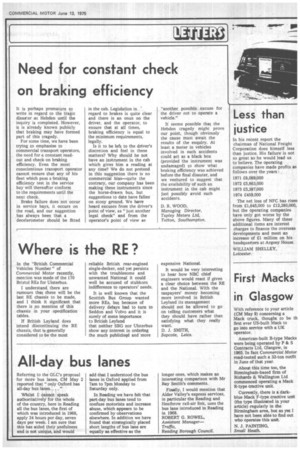Need for constant check on braking efficiency
Page 25

If you've noticed an error in this article please click here to report it so we can fix it.
It is perhaps premature to write in regard to the tragic disaater at Hebden until the inquiry is completed. However, it is already known publicly that braking may have formed part of this tragedy.
For some time, we have been trying to emphasise to commercial transport operators, the need for a constant readout and check on braking efficiency. Even the most conscientious transport operator cannot ensure that any of his fleet which pass a braking efficiency test in the service bay will thereafter conform to the requirements until the next check.
Brake failure does not occur in service bays, it occurs on the road, and our suggestion has always been that a decelerometer should be fitted in the cab. Legislation in \ regard to brakes is quite clear and there is an onus on the driver, and the operator, to ensure that at all times, braking efficiency is equal to the minimum requirements, legally.
Is it to be left to the driver's discretion and feel in these matters? Why should he not have an instrument in the cab which gives him a reading at any time? We do not pretend in this suggestion there is no commercial bias—quite the contrary, our company has been making these instruments since the horse-drawn bus, but suggestions to date have fallen on stony ground. We have heard excuses from the driver's point of view, as "just another legal check" and from the operator's point of view as "another possible excuse for the driver not to operate a vehicle."
It seems possible that the Hebden tragedy might prove our point, though obviously the cause must await the results of the enquiry. At least a meter in vehicles involved in such accidents could act as a black box (provided the instrument was undamaged) to show what braking efficiency was achieved before the final disaster, and we ventured to suggest that the availability of such an instrument in the cab might just possibly avoid such accidents.
D. R. WOOD, Managing Director, Tapley Meters Ltd, Totton, Southampton.




















































































